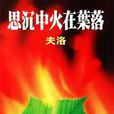《落葉在火中沈思》是一部圖書,作者是洛夫。
基本介紹
- 書名:落葉在火中沈思
- 作者:洛夫
- ISBN:9789576392467
內容介紹,作者介紹,
內容介紹
火中的落葉,這個意象有點形而上的詭異,這與火中的鳳凰其實同樣是一種超越,一種涅槃。落葉在火中沉思,這就更加令人苦思不得其解,生死的問題最好去問莊子,但也許有人不假思索,恍然而悟。
落葉習慣在火中沉思 火中的落葉,這個意象有點形而上的詭異,這與火中的鳳凰其實同樣是一種超越,一種涅槃。落葉在火中沉思,這就更加令人苦思不得其解,生死的問題最好去問莊子,但也許有人不假思索,恍然而悟。 這本來是作者的一句詩,原句是:「落葉習慣在火中沉思」,現刪除「習慣」二字,成了新出版的散文集的書名。可是這個集子裡並沒有這麼一篇文章;按照慣例,書名通常是選自書內文章的篇名;這個集子最初叫《雪樓雜記》,但出版人說:甚麼「記」甚麼「集」的,這類書名稍嫌陳舊,對讀者已失去吸引力,勸說另取一個新的書名,於是略加思考,便決定採用這個和這些文章全不搭調的名字。
作者介紹
洛 夫 小 傳
1954年與友人共同創辦《創世紀》詩刊,歷任總編輯數十年。作品被譯成英、法、日、韓、荷蘭、瑞典、南斯拉夫等文,並收入各大詩集,包括《中國當代十大詩人選集》。
洛夫著作甚豐。出版詩集《時間之傷》等三十一部,散文集《一朵午荷》等六部,評論集《詩人之鏡》等五部,譯著《雨果傳》等八部。他的名作《石室之死亡》廣受詩壇重視,三十多年來評論不斷,英譯本已於一九九四年由美國舊金山道朗出版社出版。一九八二年他的長詩《血的再版》獲中國時報文學推薦獎。同年,詩集《時間之傷》獲中山文藝創作獎,一九八三年獲吳三連文藝獎。一九九一年獲台灣文藝獎。一九九九年,洛夫詩集《魔歌》被評選為台灣文學經典之一。二零零一年三千行長詩《漂木》出版,震驚華語詩壇。二零零三年獲中國文藝協會頒贈終身成就榮譽獎。二零零四年獲北京“新詩界國際詩歌獎”的北斗星獎。
研究洛夫作品之專著很多,已出版者有《詩魔的蛻變:洛夫詩作評論集》,《洛夫與中國現代詩》,《洛夫評傳》,《一代詩魔洛夫》,《漂泊的奧義》,《悲劇主體價值的體驗——洛夫<漂木>詮釋》,《洛夫:詩?魔?禪》等。洛夫早年為一超現實主義詩人,表現手法近乎魔幻,故被詩壇譽為詩魔。他多年沉潛於書法之探索,不僅長於魏碑漢隸,尤精於行草,書風靈動瀟散,境界高遠。曾多次應邀在台北、台中、菲律賓、馬來西亞、溫哥華、紐約、濟南、深圳、杭州、衡陽等地展出。現居於加拿大溫哥華市。
Lo Fu is the pen name of Mo Lo-fu, who was born in Hunan Province of China in 1928. A graduate from the English Department of Tamkang University in Taiwan, he lectured at Soochow University in the middle 1970’s. He is probably the most widely read contemporary poet on both sides of the Taiwan Strait and in other Chinese-speaking regions. He has exerted immense influence on modern Chinese poetry as the Long-term chief editor of the Epoch Poetry Quarterly, which he co-founded with two other poets in 1954.
He has published 31collections of poems, 6 collections of prose, 5 books of critical essays and translated 8 English books. Many of his poems have been translated into English, French, Japanese, Korean, Dutch, Swedish and Yugoslavian, and are include in many poetry anthologies, one of which is Anthology of Ten Major Contemporary Chinese Poets. His most noted book of poems, DEATH IN THE STONE CELL, has been the focus of heated discussions among literary critics for decades since its first appearance in 1964. An English translation of the book was published by Taoran Press of San Francisco in 1994.
In 1982, his long poem A REPRINT OF BLOOD won him a prestigious China Times Literary Award. And in the same year he also won the Sun Yat-sen Memorial Literary Award for his poetry collection WOUNDS OF TIME. Subsequently, he received a Wu San-lien Literary and Art Award in 1983 and a National Literary Award in 1991. His book of poems, SONGS OF A WIZARD, was chosen as one of the classics of Taiwan Literature in 1999. When his 3000-line long poem DRIFTWOOD was published in 2001, it received great critical acclaim in the Chinese literary world. He was then given a lifetime achievement award by Chinese Literary Association in 2003, and received the big Dipper Award of International Poetry from Beijing New Poetry Society in 2004.
Lo Fu was dubbed the “Wizard of Poetry” for the surrealistic themes and spellbinding imagery in his early poems. There have been a number of books devoted to the study of his poetry, among them. The Metamorphoses of the: “Wizard of Poetry” , Lo Fu and Modern Chinese Poetry, Lo Fu, A Critical biography, The Wizard of Poetry, Biography of Lo Fu, The Profound Meaning of Drifting, Personal Experience of Tragic Subjective Value. An Interpretation of Lo Fu’s Drift wood.
Lo Fu’s other crowning achievement is calligraphy. With tireless practice for many years, he has grasped the secret of calligraphic expressiveness. The stroke movement of his calligraphy is brisk yet relaxed, evoking lofty sentiments and imagination in the viewer’s mind. His calligraphic works have been widely exhibited in Taiwan, the Philippines, Malaysia, Vancouver and New York, as will as many cities in China.
He currently lives in Vancouver, serving as the president of the Driftwood Artist Society and often travels to China as guest lecturer in the Chinese Huaqiao University and Kuangxi Nationality University.

